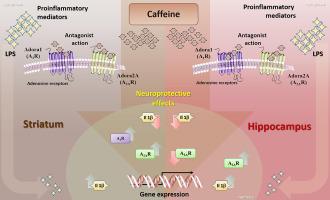当前位置:
X-MOL 学术
›
Brain Res.
›
论文详情
Our official English website, www.x-mol.net, welcomes your feedback! (Note: you will need to create a separate account there.)
Adora2A downregulation promotes caffeine neuroprotective effect against LPS-induced neuroinflammation in the hippocampus
Brain Research ( IF 2.9 ) Pub Date : 2024-03-15 , DOI: 10.1016/j.brainres.2024.148866 Paula Lemes dos Santos Sanna , Liebert Bernardes Carvalho , Camila Cristina dos Santos Afonso , Kassia de Carvalho , Rogério Aires , Jennyffer Souza , Marcel Rodrigues Ferreira , Alexander Birbrair , Maria Martha Bernardi , Alexandra Latini , Rodrigo A. Foganholi da Silva
Brain Research ( IF 2.9 ) Pub Date : 2024-03-15 , DOI: 10.1016/j.brainres.2024.148866 Paula Lemes dos Santos Sanna , Liebert Bernardes Carvalho , Camila Cristina dos Santos Afonso , Kassia de Carvalho , Rogério Aires , Jennyffer Souza , Marcel Rodrigues Ferreira , Alexander Birbrair , Maria Martha Bernardi , Alexandra Latini , Rodrigo A. Foganholi da Silva

|
Caffeine has been extensively studied in the context of CNS pathologies as many researchers have shown that consuming it reduces pro-inflammatory biomarkers, potentially delaying the progression of neurodegenerative pathologies. Several lines of evidence suggest that adenosine receptors, especially A and AA receptors, are the main targets of its neuroprotective action. We found that caffeine pretreatment 15 min before LPS administration reduced the expression of Il1b in the hippocampus and striatum. The harmful modulation of caffeine-induced inflammatory response involved the downregulation of the expression of AA receptors, especially in the hippocampus. Caffeine treatment alone promoted the downregulation of the adenosinergic receptor Adora2A; however, this promotion effect was reversed by LPS. Although administering caffeine increased the expression of the enzymes DNA methyltransferases 1 and 3A and decreased the expression of the demethylase enzyme Tet1, this effect was reversed by LPS in the hippocampus of mice that were administered Caffeine + LPS, relative to the basal condition; no significant differences were observed in the methylation status of the promoter regions of adenosine receptors. Finally, the bioinformatics analysis of the expanded network demonstrated the following results: the Adora2B gene connects the extended networks of the adenosine receptors Adora1 and Adora2A; the Mapk3 and Esr1 genes connect the extended Adora1 network; the Mapk4 and Arrb2 genes connect the extended Adora2A network with the extended network of the proinflammatory cytokine Il1β. These results indicated that the anti-inflammatory effects of acute caffeine administration in the hippocampus may be mediated by a complex network of interdependencies between the Adora2B and Adora2A genes.
中文翻译:

Adora2A 下调促进咖啡因对 LPS 诱导的海马神经炎症的神经保护作用
咖啡因已在中枢神经系统病理学背景下进行了广泛研究,因为许多研究人员表明,摄入咖啡因可以减少促炎生物标志物,可能延缓神经退行性病理学的进展。多项证据表明,腺苷受体,尤其是 A 和 AA 受体,是其神经保护作用的主要目标。我们发现LPS给药前15分钟的咖啡因预处理降低了海马和纹状体中Il1b的表达。咖啡因引起的炎症反应的有害调节涉及 AA 受体表达的下调,尤其是在海马中。单独的咖啡因治疗促进腺苷受体 Adora2A 的下调;然而,这种促进作用却被LPS逆转了。尽管给予咖啡因会增加 DNA 甲基转移酶 1 和 3A 的表达,并降低脱甲基酶 Tet1 的表达,但相对于基础条件,给予咖啡因 + LPS 的小鼠海马体中的 LPS 可以逆转这种作用;腺苷受体启动子区域的甲基化状态没有观察到显着差异。最后,对扩展网络的生物信息学分析证明了以下结果:Adora2B基因连接了腺苷受体Adora1和Adora2A的扩展网络; Mapk3和Esr1基因连接扩展的Adora1网络; Mapk4 和 Arrb2 基因将扩展的 Adora2A 网络与促炎细胞因子 Il1β 的扩展网络连接起来。这些结果表明,海马体内急性咖啡因的抗炎作用可能是由 Adora2B 和 Adora2A 基因之间复杂的相互依赖性网络介导的。
更新日期:2024-03-15
中文翻译:

Adora2A 下调促进咖啡因对 LPS 诱导的海马神经炎症的神经保护作用
咖啡因已在中枢神经系统病理学背景下进行了广泛研究,因为许多研究人员表明,摄入咖啡因可以减少促炎生物标志物,可能延缓神经退行性病理学的进展。多项证据表明,腺苷受体,尤其是 A 和 AA 受体,是其神经保护作用的主要目标。我们发现LPS给药前15分钟的咖啡因预处理降低了海马和纹状体中Il1b的表达。咖啡因引起的炎症反应的有害调节涉及 AA 受体表达的下调,尤其是在海马中。单独的咖啡因治疗促进腺苷受体 Adora2A 的下调;然而,这种促进作用却被LPS逆转了。尽管给予咖啡因会增加 DNA 甲基转移酶 1 和 3A 的表达,并降低脱甲基酶 Tet1 的表达,但相对于基础条件,给予咖啡因 + LPS 的小鼠海马体中的 LPS 可以逆转这种作用;腺苷受体启动子区域的甲基化状态没有观察到显着差异。最后,对扩展网络的生物信息学分析证明了以下结果:Adora2B基因连接了腺苷受体Adora1和Adora2A的扩展网络; Mapk3和Esr1基因连接扩展的Adora1网络; Mapk4 和 Arrb2 基因将扩展的 Adora2A 网络与促炎细胞因子 Il1β 的扩展网络连接起来。这些结果表明,海马体内急性咖啡因的抗炎作用可能是由 Adora2B 和 Adora2A 基因之间复杂的相互依赖性网络介导的。



























 京公网安备 11010802027423号
京公网安备 11010802027423号